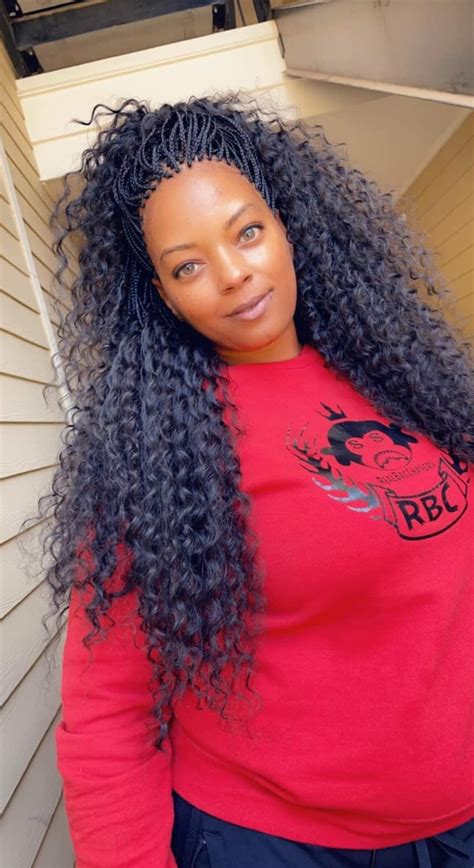Introduction
Human hair extensions have gained immense popularity in recent years due to their versatility, natural appearance, and ability to enhance any hairstyle. When it comes to braiding, human hair is the ultimate choice for creating intricate, long-lasting styles that turn heads. Here’s a comprehensive guide to everything you need to know about human hair for braids.

Types of Human Hair for Braids
1. Remy Hair:
- Premium quality hair with cuticles aligned in the same direction
- Ensures minimal tangling and shedding
- Perfect for box braids, cornrows, and French braids
2. Non-Remy Hair:
- Less expensive than Remy hair
- Cuticles are not aligned, leading to more tangles and shedding
- Suitable for temporary braids or styles that don’t require a sleek finish
3. Virgin Hair:
- Purest form of human hair that has never been chemically treated
- Most expensive option, but offers exceptional quality and longevity
- Ideal for goddess braids, butterfly braids, and other elegant styles
Benefits of Human Hair Braids
1. Natural Appearance:
- Blends seamlessly with your natural hair for a realistic and flattering effect
- Adds volume, length, and color to your hair without compromising its health
2. Long-Lasting:
- With proper care, human hair braids can last for weeks or even months
- Ideal for those who want to maintain a protective hairstyle without the hassle of frequent touch-ups
3. Versatile Styling Options:
- Braids made with human hair can be styled in countless ways
- Create intricate patterns, add beads or extensions, or incorporate other hair accessories for a unique look
4. Protective Hairstyle:
- Braiding your natural hair with human hair extensions helps protect it from damage caused by heat, styling products, and environmental factors
How to Choose Human Hair for Braids
1. Consider Hair Texture:
- Match the texture of your natural hair to the extensions for a natural blend
- Remy hair is a good option for all hair types
2. Determine Length:
- Think about the desired length of your braids
- Extensions come in various lengths, from shoulder-length to waist-length
3. Choose Color:
- Select a color that complements your natural hair or create a dramatic contrast
- Remy hair can be dyed or bleached to match your desired color
Installation and Care of Human Hair Braids
Installation:
- Braid your natural hair into small sections
- Attach the human hair extensions using a braiding technique such as box braiding, cornrowing, or French braiding
- Secure the ends with beads or string for a long-lasting hold
Care:
- Wash braids gently with sulfate-free shampoo and conditioner
- Deep condition braids once a week to keep them moisturized
- Avoid using heat styling tools directly on braids
- Sleep with a satin bonnet or scarf to prevent tangles and breakage
Common Pain Points and Motivations for Human Hair Braids
Pain Points:
- Tangling and shedding, especially with non-Remy hair
- Difficulty maintaining braids for extended periods
- Cost of premium human hair extensions
Motivations:
- Desire for a protective hairstyle that promotes hair growth
- Create versatile and stylish braids that enhance appearance
- Add volume and length to natural hair without damage
Innovative Applications of Human Hair for Braids
“Braidscaping” is an emerging trend that utilizes human hair braids as a creative medium. Artists create intricate patterns and designs on the scalp using braids, beads, and hair accessories. This innovative application transforms braids into an art form that combines fashion, creativity, and self-expression.
Tables for Quick Reference
Table 1: Types of Human Hair for Braids
| Type | Description | Pros | Cons |
|---|---|---|---|
| Remy Hair | Cuticles aligned in the same direction | Minimal tangling and shedding, natural appearance | More expensive |
| Non-Remy Hair | Cuticles not aligned | More affordable, suitable for temporary braids | Can tangle and shed |
| Virgin Hair | Purest and most expensive | Exceptional quality and longevity | Not always available in all textures and colors |
Table 2: Benefits of Human Hair Braids
| Benefit | Description | Impact |
|---|---|---|
| Natural Appearance | Blends seamlessly with natural hair | Enhances hairstyle while maintaining a realistic look |
| Long-Lasting | Can last for weeks or months | Reduces maintenance and touch-up costs |
| Versatile Styling Options | Can be styled in countless ways | Allows for creativity and self-expression |
| Protective Hairstyle | Protects natural hair from damage | Promotes hair growth and minimizes breakage |
Table 3: Considerations for Choosing Human Hair for Braids
| Factor | Considerations | Details |
|---|---|---|
| Hair Texture | Match to natural hair | Ensure a seamless blend |
| Length | Determine desired length | Varies from shoulder-length to waist-length |
| Color | Select a complementing color | Match or contrast with natural hair |
Table 4: Care and Maintenance of Human Hair Braids
| Task | Instructions | Purpose |
|---|---|---|
| Washing | Use sulfate-free shampoo and conditioner | Clean braids gently without stripping oils |
| Deep Conditioning | Condition once a week | Hydrate and nourish braids, prevent breakage |
| Heat Styling | Avoid direct heat application | Protect braids from damage |
| Nighttime Protection | Sleep with satin bonnet or scarf | Prevent tangles and breakage while sleeping |
Frequently Asked Questions (FAQs)
1. How long do human hair braids last?
– With proper care, human hair braids can last for several weeks or even months.
2. Are human hair braids heavy?
– The weight of human hair braids depends on the length, texture, and amount of hair used. However, they are generally lighter than synthetic braids.
3. Can human hair braids be bleached or dyed?
– Remy hair can be bleached or dyed to match desired hair color, while non-Remy hair may not hold color as well.
4. How do I avoid tangles and shedding with human hair braids?
– Use sulfate-free products, deep condition regularly, and sleep with a satin bonnet to minimize tangles and shedding.
5. Are human hair braids expensive?
– The cost of human hair braids varies depending on the quality, length, and installation technique used.
6. How do I choose the best braider?
– Look for experienced and reputable braiders who use high-quality hair and proper techniques.
7. Can human hair braids be braided into different styles?
– Yes, human hair braids are extremely versatile and can be styled into a wide variety of patterns and designs.
8. Are human hair braids comfortable to wear?
– With proper installation and care, human hair braids can be comfortable to wear for extended periods.
